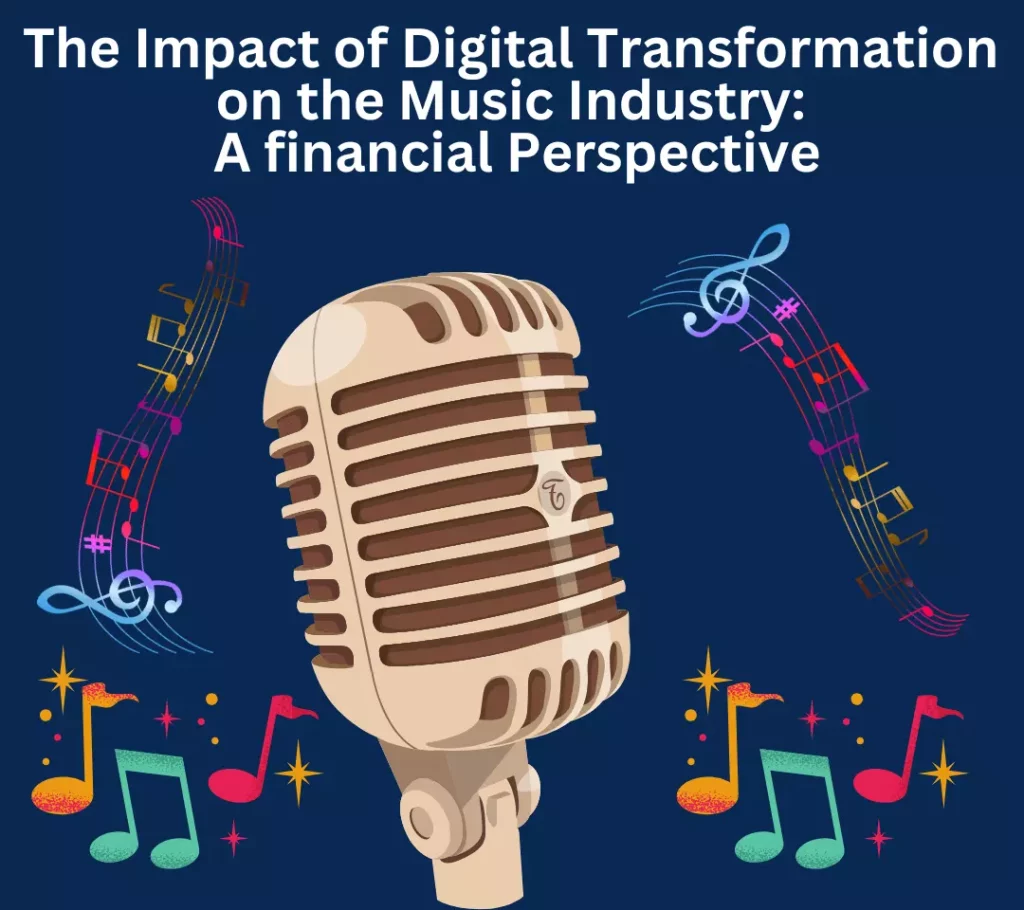The music industry has experienced a profound transformation in recent years, driven by technological advancements and changing consumer behavior. This digital revolution has affected how music is created, distributed, and consumed and has had a significant financial impact on the industry. This economic impact has reshaped revenue streams and business models.
This article will explore the financial implications of digital transformation in the music industry and discuss the key drivers, benefits, challenges, and strategies associated with this paradigm shift.

Key Drivers of Digital Transformation in the Music Industry
The music industry is undergoing significant development driven by various vital drivers. Technological advancements, changing consumer behavior, and industry shifts towards digital distribution and streaming are at the forefront of this digital revolution. In this section, we will learn these key drivers and their impact on reshaping the financial landscape of the music industry.
Technological Advancements
The rapid advancement of digital technologies, such as streaming platforms, MP3 converter software, and high-speed internet, has revolutionized how music is consumed, distributed, and monetized. These advancements have created new opportunities for artists, record labels, and music companies to reach a global audience.
Changing Consumer Behavior and Expectations
With the proliferation of smartphones and the convenience of digital platforms, consumers have shifted from physical music formats to digital streaming services. This behavior change has forced industry stakeholders to adapt their strategies and embrace digital transformation to meet consumer demands.
Industry Shifts Towards Digital Distribution and Streaming
The emergence of digital music platforms, such as Spotify and Apple Music, has transformed how music is distributed and monetized. Streaming services have become the primary revenue source for the industry, replacing traditional physical sales. The shift toward digital distribution has disrupted the industry’s revenue models, requiring stakeholders to recalibrate their strategies.
The Financial Benefits of Digital Transformation in the Music Industry
From increased revenue streams through digital channels to cost savings and operational efficiencies and improved data analytics for informed decision-making, the financial impact of digital transformation has been substantial. Let’s delve deeper into the economic advantages the music industry has gained by embracing digital transformation.
1. Increased Revenue Streams
Digital transformation has opened up new revenue streams for the music industry. Streaming services, digital downloads, and online merchandise sales have provided artists and labels with additional income sources. Moreover, the global reach of digital platforms allows artists to tap into previously untapped markets, expanding their fan base and revenue potential.
2. Cost savings and operational efficiencies
Digital transformation has streamlined many aspects of the music industry, leading to cost savings and operational efficiencies. For example, transitioning from physical to digital distribution eliminates manufacturing and inventory costs. Additionally, digital platforms enable targeted marketing campaigns, reducing marketing expenses while improving the effectiveness of promotional efforts.
3. Improved data analytics and decision-making
Digital platforms generate vast amounts of data businesses can analyze to gain insights into consumer behavior, preferences, and market trends. This data-driven approach allows industry stakeholders to make informed decisions about content creation, marketing strategies, and resource allocation. By leveraging data analytics, music companies can identify emerging trends, optimize their offerings, and maximize their financial returns.
Challenges and Risks in the Digital Transformation Journey
As the music industry undergoes digital transformation, it faces many challenges and risks that can impact its financial performance. This section will explore key challenges and risks that industry stakeholders must navigate along their digital transformation journey.
Copyright and Piracy Concerns
The digital era has brought challenges in protecting intellectual property rights and combating piracy. Unauthorized distribution and illegal downloads pose a significant threat to artists and music companies, potentially eroding their revenue streams. Industry stakeholders must invest in robust copyright protection measures and collaborate with technology platforms to tackle piracy effectively.
Revenue Sharing and Artist Compensation Issues
While digital platforms offer new revenue streams, income distribution among artists, songwriters, and music labels has been debated. Issues surrounding fair compensation, transparent revenue-sharing models, and royalty rates need to be addressed to ensure a sustainable ecosystem that benefits all stakeholders involved.
Impact on Traditional Revenue Streams
As the music industry undergoes digital transformation, traditional revenue streams, such as physical album sales and radio play royalties, have declined. Artists and labels must adapt to this new reality by diversifying their income sources and exploring alternative monetization avenues.
Strategies for Embracing Digital Transformation in the Music Industry
As the music industry undergoes a digital revolution, artists, record labels, and music companies must develop effective strategies for embracing and harnessing the power of digital transformation. Let us explore critical strategies that can enable organizations to navigate the digital landscape successfully.
Tip 1. Develop a comprehensive digital strategy
Music companies must develop a well-defined digital strategy aligning with their overall business goals. This strategy should encompass content creation, digital distribution, marketing, data analytics, and artist engagement. A holistic approach to digital transformation ensures that organizations leverage the full potential of digital platforms to drive revenue growth and enhance their financial performance.
Tip 2. Invest in infrastructure and technology
Music companies must invest in robust infrastructure and cutting-edge technologies to successfully navigate the digital landscape. It includes building scalable streaming platforms, implementing secure digital rights management systems, and leveraging data analytics tools. By strategically investing in technology, organizations can improve operational efficiency, enhance user experiences, and capitalize on emerging trends.
Tip 3. Collaborate and partner with digital platforms
Collaboration is critical to thriving in the digital era. Music companies should forge partnerships with digital platforms and streaming services to expand their reach and access new audiences. These interactions can lead to mutually beneficial outcomes, such as revenue-sharing agreements, curated playlists, and promotional opportunities. By embracing collaboration, organizations can leverage the strengths of digital platforms and amplify their financial success.
Case Studies: Successful Digital Transformation in the Music Industry
Spotify
Spotify revolutionized the music industry by popularizing the streaming model. Through its user-friendly interface, personalized recommendations, and extensive catalog, Spotify attracted millions of subscribers worldwide. The company’s success depends on its capability to adapt to changing consumer preferences and build strong partnerships with artists, record labels, and brands. Spotify’s financial growth can be attributed to its innovative approach to digital transformation.
Universal Music Group
Universal Music Group (UMG), one of the largest music companies globally, embraced digital transformation by leveraging data analytics. UMG partnered with analytics firms to gain insights into consumer behavior, market trends, and artist performance. Using data-driven decision-making, UMG optimized its marketing strategies, identified emerging artists, and maximized revenue streams. UMG’s success highlights the power of data analytics in driving financial success in the music industry.
The Future of Digital Transformation in the Music Industry
Emerging technologies, evolving business models, and the role of artificial intelligence and machine learning are set to shape the financial landscape of the industry. Below are some potential impacts of these factors and how they can drive innovation and create new revenue streams for music companies.
Emerging technologies
The music industry is poised to witness further digital disruption through emerging technologies. Artificial intelligence (AI), virtual reality (VR), and blockchain have the potential to reshape the music landscape. AI-powered recommendation engines can provide more personalized music experiences, while VR technology can revolutionize live performances and fan engagement. Additionally, blockchain has the potential to enhance royalty tracking and transparency, addressing some of the industry’s revenue-sharing challenges.
Evolving business models and revenue streams
As digital transformation evolves, new business models and revenue streams will emerge. Subscription-based streaming services will grow with tiered pricing models and exclusive content offerings. Additionally, innovative monetization avenues, such as virtual concerts, live-streamed events, and branded partnerships, will play a significant role in the music industry’s financial future.
AI and machine learning
Artificial intelligence and machine learning will be increasingly vital in the music industry’s financial landscape. These developments can analyze vast amounts of data to predict consumer behavior, optimize marketing strategies, and identify untapped revenue opportunities. By harnessing the potential of AI and machine learning, music companies can drive financial growth and gain a competitive edge.
Conclusion
Digital transformation has had a profound financial impact on the music industry, revolutionizing revenue streams, business models, and consumer experiences. By embracing digital technologies, leveraging data analytics, and forging strategic collaborations, music companies can navigate the challenges and unlock the financial benefits of the digital era. The industry’s future is continuously adapting to emerging technologies, evolving business models, and data-driven decision-making. As the music industry continues its digital transformation journey, stakeholders must embrace innovation, collaboration, and a customer-centric approach to secure long-term financial success.



